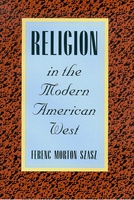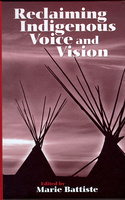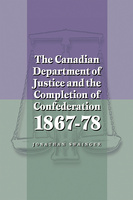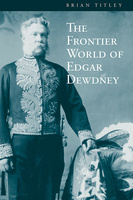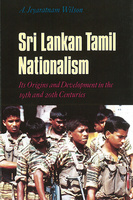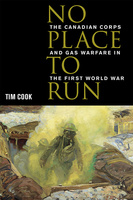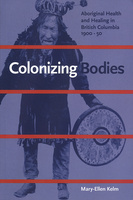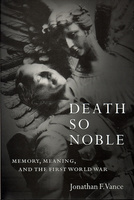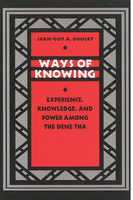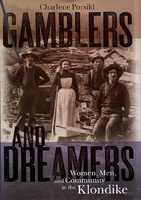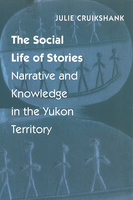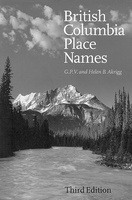The Chinese in Vancouver, 1945-80
The Pursuit of Identity and Power
Wing Chung Ng captures the fascinating story of the city's Chinese in their search for identity.
Religion in the Modern American West
When Americans migrated west, they carried with them not only their hopes for better lives but their religious traditions as well. Yet the importance of religion in the forging of a western identity has seldom been examined. In this first historical overview of religion in the modern American West, Ferenc Szasz shows the important role that organized religion played in the shaping of the region from the late-nineteenth to late-twentieth century. He traces the major faiths over that time span, analyzes the distinctive response of western religious institutions to national events, and shows how western cities became homes to a variety of organized faiths that cast only faint shadows back east. While many historians have minimized the importance of religion for the region, Szasz maintains that it lies at the very heart of the western experience. From the 1890s to the 1920s, churches and synagogues created institutions such as schools and hospitals that shaped their local communities; during the Great Depression, the Latter-day Saints introduced their innovative social welfare system; and in later years, Pentecostal groups carried their traditions to the Pacific coast and Southern Baptists (among others) set out in earnest to evangelize the Far West. Beginning in the 1960s, the arrival of Asian faiths, the revitalization of evangelical Protestantism, the ferment of post-Vatican II Catholicism, the rediscovery of Native American spirituality, and the emergence of New Age sects combined to make western cities such as Los Angeles and San Francisco among the most religiously pluralistic in the world. Examining the careers of key figures in western religion, from Rabbi William Friedman to Reverend Robert H. Schuller, Szasz balances specific and general trends to weave the story of religion into a wider social and cultural context. Religion in the Modern American West calls attention to an often overlooked facet of regional history and broadens our understanding of the American experience.
Reclaiming Indigenous Voice and Vision
This inspiring volume elaborates a new inclusive vision of a global and national order and articulates new approaches for protecting, healing, and restoring long-oppressed peoples, and for respecting their cultures and languages.
Potlatch at Gitsegukla
William Beynon's 1945 Field Notebooks
This rare, first-hand, ethnographic account of a potlatch from Tsimshian scholar William Benyon reveals the wonderful complexities of the events that took place in Gitsegukla in 1945.
Islands of Truth
The Imperial Fashioning of Vancouver Island
Timely, provocative, and a vital contribution to post-colonial studies, this book questions premises underlying much of present B.C. historical writing, arguing that international literature offers more fruitful ways of framing local historical experiences.
Telling Tales
Essays in Western Women's History
Telling Tales both challenges founding myths of the region and inspires rethinking of how we tell the story of western Canadian colonization and settlement.
The Chaco Mission Frontier
Spanish missions in the New World usually pacified sedentary peoples accustomed to the agricultural mode of mission life, prompting many scholars to generalize about mission history. James Saeger now reconsiders the effectiveness of the missions by examining how Guaycuruan peoples of South America's Gran Chaco adapted to them during ...
The Canadian Department of Justice and the Completion of Confederation 1867-78
Drawing on legal records and other archival documents, Jonathan Swainger considers the growth and development of the ostensibly apolitical Department of Justice in the eleven years after the union of 1867.
The Frontier World of Edgar Dewdney
The Frontier World of Edgar Dewdney is a biography of a man who played a key role in the events which marked the political, social, and economic transformation of western Canada in the latter half of the nineteenth century.
Sri Lankan Tamil Nationalism
This book offers a concise history of the Sri Lankan Tamil nation, examining its culture and political evolution.
Against the Grain
Foresters and Politics in Nova Scotia
This book argues that forestry is a more diverse and complex activity than has been generally recognized. It also underlines the political character of the profession.
The Burden of History
Colonialism and the Frontier Myth in a Rural Canadian Community
Since the Time of the Transformers
The Ancient Heritage of the Nuu-chah-nulth, Ditidaht, and Makah
This book examines over 4000 years of culture history of the related Nuu-chah-nulth, Ditidaht, and Makah peoples on western Vancouver Island and the Olympic Peninsula.
Huron-Wendat
The Heritage of the Circle
In this book, Georges Sioui, who is himself Wendat, redeems the original name of his people and tells their centuries-old history by describing their social ideas and philosophy and the relevance of both to contemporary life.
Pacific Empires
Essays in Honour of Glyndwr Williams
A new interest in European maritime exploration was aroused with the publication of the first volume of J.C. Beaglehole's edition of The Journals of Captain James Cook in 1955. In the forty-odd years since then ...
No Place to Run
The Canadian Corps and Gas Warfare in the First World War
This book is a reevaluation of the Canadian Corps and poison gas in WWI. It examines how the Canadian Corps organized and protected its soldiers from poison gas.
Once Upon an Oldman
Special Interest Politics and the Oldman River Dam
Once Upon an Oldman is an account of the controversy that surrounded the Alberta government's construction of a dam on the Oldman River to provide water for irrigation in the southern part of the province.
Another Kind of Justice
Canadian Military Law from Confederation to Somalia
The first historical survey of Canadian military law, providing insights into military justice in Canada, the purpose of military law, and the level of legal professionalism within the Canadian military.
Colonizing Bodies
Aboriginal Health and Healing in British Columbia, 1900-50
This detailed but highly readable ethnohistory shows how a pluralistic medical system evolved among Canada’s most populous Aboriginal population.
Clearcutting the Pacific Rain Forest
Production, Science, and Regulation
This book integrates class, environmental, and political analysis to uncover the history of clearcutting in the Douglas fir forests of BC, Washington, and Oregon between 1880 and 1965.
Death So Noble
Memory, Meaning, and the First World War
This book examines Canada’s collective memory of the First World War through the 1920s and 1930s. It is a cultural history, considering art, music, and literature.
Painting the Maple
Essays on Race, Gender, and the Construction of Canada
Gathering insights from numerous fields about the construction of Canada, this provocative volume illuminates the challenges that lie ahead for all Canadians who aspire to create a better future.
Ways of Knowing
Experience, Knowledge, and Power among the Dene Tha
Drawing on twelve years of fieldwork at Chateh, Jean-Guy Goulet delineates the interconnections between the strands of meaning and experience with which the Dene Tha constitute and creatively engage their world.
The Limits of Labour
Class Formation and the Labour Movement in Calgary, 1883-1929
Spuzzum
Fraser Canyon Histories 1808-1939
Juxtaposing historical narratives and cultural interpretation, this book explores the history of Spuzzum and the Nlaka'pamux people on the turbulent Fraser River.
Fort Langley Journals, 1827-30
Contains a wealth of information about social and administrative life at Fort Langley.
Aboriginal and Treaty Rights in Canada
These essays aim to address, and redress, this bias of the colonial doctrine that continues to define and shape Aboriginal and treaty rights in the Canadian legal system.
Borderlands
How We Talk About Canada
In Borderlands, W.H. New poetically and metaphorically considers the image of 'the border' in Canada and how it affects the way Canadians look at themselves and their society.
Legends of Our Times
Native Cowboy Life
Throughout the world, the image of the cowboy is an instantly recognized symbol of the North American West. This lavishly illustrated book tells the story of some of the first cowboys – the Native peoples of the Plains and Plateau.
Positioning the Missionary
John Booth Good and the Confluence of Cultures in Nineteenth-Century British Columbia
This book examines Anglican missionary work in nineteenth-century British Columbia at several scales: the local ethnographic literature; histories of contact and conflict in mainland B.C. from the early nineteenth century; the theology and sociology of mission; and the recent critical literature on European colonialism.
Gamblers and Dreamers
Women, Men, and Community in the Klondike
Gamblers and Dreamers tackles some of the myths about the history of the North in the era of the gold rush.
The Social Life of Stories
Narrative and Knowledge in the Yukon Territory
In this illuminating study of indigenous oral narratives, Julie Cruikshank moves beyond the text to explore the social power and significance of storytelling.
The Dynamics of Native Politics
The Alberta Metis Experience
A socio-cultural examination of the political organizations that advocate for Aboriginal rights in government policy and the rationale behind them.
Canada and Quebec
One Country, Two Histories: Revised Edition
In this revised edition of Canada and Quebec, Robert Bothwell describes the lead-up to the October 1995 referendum and traces political developments from its immediate aftermath to the present.
Japanese Historians and the National Myths, 1600-1945
The Age of the Gods and Emperor Jinmu
This is the first comprehensive study of modern Japanese historians and their relationship to nationalism and how they interpreted ancient myths of their origins.
Hidden Dimensions
The Cultural Significance of Wetland Archaeology
Scholars from around the globe examine several aspects of wetland archaeology in North America, Mexico, Europe, eastern Siberia, and New Zealand.
The Lifeline of the Oregon Country
The Fraser-Columbia Brigade System, 1811-47
In The Lifeline of the Oregon Country, James Gibson compellingly immerses the reader in one of the most intractable problems faced by the Hudson’s Bay Company: how to realize wealth from such a remote and formidable land.
Creating Historical Memory
English-Canadian Women and the Work of History
This engaging collection of essays seeks to create an awareness of the contributions made by women to history and the historical profession from 1870 to 1970 in English Canada.
Walking in Indian Moccasins
The Native Policies of Tommy Douglas and the CCF
This landmark study examines the Tommy Douglas's Co-operative Commonwealth Federation government - the first socialist government in North America - and the development of policies aimed at Indian and Metis people in the post-war period.


